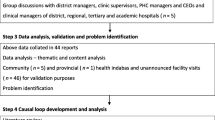Abstract
Residents in rural communities increasingly face shortages in health care service. Consequently, German municipalities are driven by a strong attempt to transform care trajectories in rural areas. This qualitative study aims to identify the preferences of rural community residents towards the future service provision. Semi-structured focus group interviews were performed by means of a structured interview guide developed on the basis of a systematic literature review on expectations towards the provision of health care service. Participants were recruited in three rural communities in Western Germany. In total, three focus group interviews including 21 participants were performed. Overall, the interviews resulted in ten attributes grouped in three major domains: access to care, service delivery characteristics, and service costs. The rural population in Germany rejects outpatient care performed by hospitals and favors the provision of health care services by familiar doctor offices and occasionally interprofessional forms of outpatient care. Focus groups are an effective means to categorize preferences of the general population regarding outpatient health care service delivery patterns.

Similar content being viewed by others
References
Weinhold I, Gurtner S. Understanding shortages of sufficient health care in rural areas. Health Policy. 2014;118:201–14.
Coady V, Warren N, Bilkhu N, Ayton D. Preferences for rural specialist health care in the treatment of Parkinson’s disease: exploring the role of community-based nursing specialists. Aust J Prim Health. 2019;25:49–53.
Scheffler RM, Arnold RD. Projecting shortages and surpluses of doctors and nurses in the OECD: what looms ahead. Health Econ Policy Law. 2019;14:274–90.
Ministers of Health/Ministers of Education. Joint report of the conference of Ministers of Health and the Conference of Ministers of Education for the protection of healthcare professionals. (Resolution of the Conference of the Ministers of Health from 12.06.2015/Resolution of the Conference of the Ministers of Health from 24./25.06.2015) [In German). 2015. https://www.kmk.org/fileadmin/Dateien/veroeffentlichungen_beschluesse/2015/2015_06_12-Fachkraeftesicherung-im-Gesundheitswesen.pdf Accessed 15 Jul 2019.
Mergenthal K, Güthlin C, Beyer M, Gerlach FM, Siebenhofer A. How patients view and accept health care services provided by health care assistants in the general practice: survey of participants of the GP-centered health care program in Baden-Wuerttemberg [in German]. Gesundheitswesen. 2018;80:1077–83.
Röttger J, Busse R. How do chronically ill patients rate medical care by their GPs and specialists? Results of a Germany-wide survey. Gesundheitswesen. 2016;78(Suppl 1):e89–96.
Weinert C, Long KA. Understanding the health care needs of rural families. Fam Relat. 1987;36:450–5.
Schmiedhofer MH, Brandner S, Kuhlmey A. Delegation of medical treatment to non-physician health care professionals: the medical care structure agneszwei in Brandenburg – a qualitative acceptance analysis [in German]. Gesundheitswesen. 2017;79:453–60.
Auschra C, Deisner J, Berghöfer A, Sydow J. Ensuring health care in rural regions: new models and measures [in German]. 2018. Project report published by the Stiftung Münch. Berlin: Free University of Berlin. https://www.stiftung-muench.org/wp-content/uploads/2018/11/Projektbericht_Sicherstellung-Gesundheitsversorgung-Land.pdf Accessed 15 Jul 2019.
Weinhold I, Gurtner S. Rural - urban differences in determinants of patient satisfaction with primary care. Soc Sci Med. 2018;212:76–85.
Löffler A, Hoffmann S, Fischer S, Spallek J. Outpatient GP and specialist care in rural areas in Germany from the point of view of older residents in the district of Oberspreewald-Lausitz. Gesundheitswesen. 2020. https://doi.org/10.1055/a-1010-6277.
Stevens PE. Focus groups: collecting aggregate-level data to understand community health phenomena. Public Health Nurs. 1996;13:170–6.
Chudner I, Goldfracht M, Goldblatt H, Drach-Zahavy A, Karkabi K. Video or in-clinic consultation? Selection of attributes as preparation for a discrete choice experiment among key stakeholders. PATIENT. 2019;12:69–82.
Danner M, Vennedey V, Hiligsmann M, Fauser S, Stock S. Focus groups in elderly ophthalmologic patients: setting the stage for quantitative preference elicitation. PATIENT. 2016;9:47–57.
Freeman M. Nurturing dialogic hermeneutics and the deliberative capacities of communities in focus groups. Qual Inq. 2006;12:81–95.
Rothwell E, Anderson R, Botkin JR. Deliberative discussion focus groups. Qual Health Res. 2016;26:734–40.
Funding
This study was funded by the Leibniz Science Campus Ruhr (member of Leibniz Association, Berlin, Germany) grant no. SAS-2016-RWI-LWC.
Author information
Authors and Affiliations
Contributions
All authors of this study developed the conception and design of the work, contributed to the application for funding, and conducted the interpretation of the data. Specifically, Sibel Altin and Anke Walendzik prepared and conducted the focus groups. The transcriptions, the analysis of the data, and the production of the manuscript were made by Sibel Altin, Michael Noweski, Anke Walendzik, Laura Krabbe, Barbara Buchberger, and Jürgen Wasem.
Corresponding author
Ethics declarations
Conflict of Interest
The authors declare that they have no conflict of interest.
Ethical Approval
The ethical review board of the University of Duisburg-Essen did not request an ethical approval.
Additional information
Publisher’s Note
Springer Nature remains neutral with regard to jurisdictional claims in published maps and institutional affiliations.
This article is part of the Topical Collection on Medicine
Electronic supplementary material
ESM 1
(PDF 251 kb)
Rights and permissions
About this article
Cite this article
Altin, S., Walendzik, A., Noweski, M. et al. Populations’ Preferences Regarding Health Care Service Delivery Patterns in Rural Areas in Western Germany—a Preliminary Survey Based on Focus Groups. SN Compr. Clin. Med. 2, 1526–1533 (2020). https://doi.org/10.1007/s42399-020-00355-4
Accepted:
Published:
Issue Date:
DOI: https://doi.org/10.1007/s42399-020-00355-4




